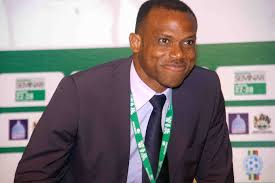By Andrew Warshaw
July 3 – One of Africa’s best-known footballing figures has defended the reputation of the Continent’s players at the World Cup, insisting they were not simply motivated by greed.
African sides have flattered to deceive in Brazil while off the field they have been embroiled, not for the first time, in a series of pay disputes, once again leading to speculation that they did not have their minds on the job at hand.
But Sunday Oliseh (pictured), who played in two World Cups for Nigeria and is now a member of FIFA’s Technical Study Group, says it goes much deeper than that and that the bad press the African nations have received isn’t justified.
Because of their unique cultural background, he argues, their financial responsibilities stretch far beyond their own ends.
“I would refute the suggestion that African players are not as committed, in fact I’d say they are more committed,” said Oliseh who won 63 caps for Nigeria and played for a raft of European clubs. “When you look at the responsibilities African players have to carry, the culture is a familiar one. It’s built around families.
“If you are earning €100, it’s not just for your wife and kids, it’s for your wife, kids, brother, cousin, aunt, sister and sister’s brother. School fees for this and that. In one kind of way, we are drained. But it’s a drainage we accept and do not complain about.
“So when African players come to the World Cup, it’s not all about money, it’s because of the fact that most of them have (been made) certain promises and these promises have not been fulfilled. It’s very easy to apportion blame but it’s a general thing because the situation is different. My mailbox is full with questions about this issue.”
Pele famously predicted that an African country would win the World Cup by the year 2000 and Oliseh attempted to explain why this hadn’t happened. “We have the quality. Ghana were within one penalty (in a shootout) of reaching the semifinals four years ago. But what we need is a solution so that everyone is satisfied before the tournament starts. It’s going to be better for everyone if we don’t have to talk about off the pitch issues. Personally I find it very painful.”
Contact the writer of this story at moc.l1745223367labto1745223367ofdlr1745223367owedi1745223367sni@w1745223367ahsra1745223367w.wer1745223367dna1745223367

